Interesting Books From 2023
Here are some of the best books I read in 2023.
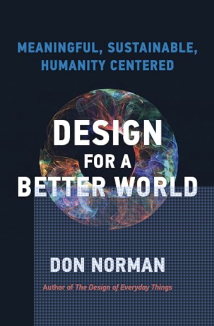
Design for a Better World: Meaningful, Sustainable, Humanity Centered.– In this insightful book, Don Norman, a giant in the design world (https://jnd.org) explores how design can be harnessed to create a better world. Norman underscores into the importance of placing humanity at the center of the design process, a vital shift in our focus as we encounter the collapse of old systems and the need to harness human ingenuity to design what’s next. Drawing on his extensive knowledge and experience, Norman provides practical examples and case studies to illustrate how design can address pressing global challenges such as climate change, inequality, and social injustice.
Some favorite quotes:
“We live in a world designed by people. Artifacts abound, from our homes and clothes to our tools, our books. The concept of countries and forms of government are artificial, designed by people. Even things that we think of as natural, a part of nature such as the earth, the environment, animals, and plants–have been shaped and impacted by people’s creations and activities. And design hasn’t affected just objects. People invented–designed –organizational structures and ways of governing themselves.”
“The things we design–the artificial–change the way we behave and act so that just as we have changed things through our designs, those things then change us, affecting how we behave and live: we design the world, and it, in turn, designs us.”
Finite and Infinite Games — In “Finite and Infinite Games,” Carse, a religious scholar, explores the concept of games as a metaphor for life. He defines a distinction between finite games, which have a specific beginning and end and are played to win, and infinite games, which have no specific endpoint and are played to continue play. It’s a powerful way to distinguish between competition — which assumes finite markets — and collaboration — which embraces the infinite possibilities of growth, exploration, and human ingenuity.
Some favorite quotes:
“There are at least two kinds of games. One could be called finite, the other infinite. A finite game is played for the purpose of winning, an infinite game for the purpose of continuing the play…If a finite game is to be won by someone it must come to a definitive end. It will come to an end when someone has won….Infinite players cannot say when their game began, nor do they care. They do not care for the reason that their game is not bounded by time. Indeed, the only purpose of the game is to prevent it from coming to an end, to keep everyone in play.”
“The rules of an infinite game are changed to prevent anyone from winning the game and to bring as many persons as possible into the play.”
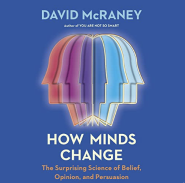
How Minds Change: The Surprising Science of Belief, Opinion, and PersuasionHow Minds Change: The Surprising Science of Belief, Opinion, and Persuasion.— McRaney explores the concept of cognitive flexibility and how our minds can change and adapt. He shares insights into the psychology and neuroscience behind belief change, providing insightful explanations on why it is often difficult to persuade others and even ourselves. He draws from various studies and examples to illustrate the factors that influence belief change, including social influences, cognitive biases, and the power of storytelling.
Some favorite quotes:
“A message becomes more impactful when paired with popular counterarguments, what psychologists call a two-sided communication. If people are initially skeptical of a persuasive message, sharing counterarguments alongside the message works best. In studies of courtroom trials, if the defense brings up damaging evidence first, then the defense seems more credible to the jury. Be it a rap battle or a political debate, by presenting your opponent’s arguments before they do, you not only demonstrate confidence in your ideas by revealing you’ve considered the other side, you also demonstrate trustworthiness by revealing you respect the audience’s intelligence.”
“What we know depends on beliefs: knowledge we assume is true. It also depends on attitudes: our positive or negative evaluations of that which we believe. And these both influence, and are influenced by, our values: our estimations of what is most important, most worth our time to pursue. But it is impossible to know or evaluate everything. The world is too vast, too complex, and ever-changing. So a hefty portion of our beliefs and attitudes are based on received wisdom from trusted peers and authorities. Whether in a video, within a textbook, behind a news desk, or standing at a pulpit, for that which we can’t prove ourselves, it is in their expertise we place our faith…Once we consider a reference group trustworthy, questioning any of their accepted beliefs or attitudes questions all of them, and this can be a problem.”
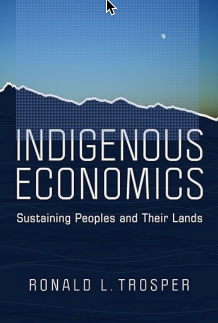
Indigenous Economics: Sustaining Peoples and Their Lands — In 2022 I began working with an indigenous leader in Ecuador, and I became fascinated with how he sees an economy differently. In this book, Trosper explores the intricate relationship between indigenous worldviews and economic practices. As we move to a global economy that is more interconnected and interdependent, understanding different economic perspectives becomes crucial. Trosper introduces us to the unique ways indigenous communities integrate their ecological conditions, cultural values, and economic activities. Here is an example from the Maori in New Zealand.
“The concept of mana in Mãori culture provides an example of a relational good generated and held by relationships. Mana is a subjective concept generated by relationships, describing the power of a person or a group to impact the lives of others, the condition of land, and the strength of generations to affect each other. Kiri Dell, Nimbus Staniland, and Amber Nicholson (2018) describe four types of mana: (1) mana from universal connectedness, (2) mana from historically developed processes, (3) mana created by connections to people and land, and (4) mana that is personal power dependent on individual attributes. Three of these are generated by relationships; the fourth, personal power, is held by persons acting in relationships. In the first three cases, persons in relationships share the power of mana…Relationships generate relational goods through the cooperation of all the people in the relationship, who orient themselves toward the production of the shared good and the joint goals or projects of the relationship.”
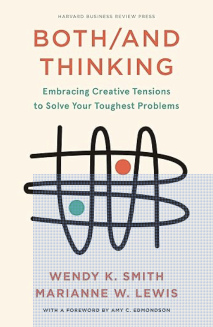
Both/And Thinking: Embracing Creative Tensions to Solve Your Toughest Problem— “Both/And Thinking” introduces readers to the concept of embracing creative tensions to solve complex problems. Through real-life examples and practical exercises, Smith and Lewis demonstrate how to navigate conflicting ideas and perspectives to find innovative solutions. They emphasize the value of considering multiple perspectives and finding common ground instead of settling for either/or solutions.
Some favorite quotes:
“Experimentation helps us navigate paradoxes, in part, by exposing hidden synergies.”
“[W]e need tools that enable dynamism. Dynamism involves actions that spur learning, enable adaptation, and encourage ongoing shifts between competing demands…Being dynamic does not mean being indecisive. People can make clear decisions when navigating paradoxes; however, being dynamic ensures that they are open to new information, can tolerate ambiguity, and are willing to rethink decisions with new information.”
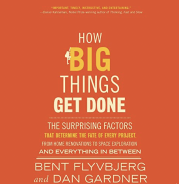
How Big Things Get Done: The Surprising Factors That Determine the Fate of Every Project, from Home Renovations to Space Exploration and Everything in Between— Based on their extensive database of complex projects, Flyvbjerg and Gardner share their insights into project management and explore the factors that contribute to the success or failure. They discuss the influence of human behavior, politics, and power dynamics on project outcomes, and they offer valuable insights. Many powerful insights in this book.
A favorite quote: “Planning, as I see it, is not merely sitting and thinking, much less a rule-based bureaucratic exercise of programming. It is an active process. Planning is doing: Try something, see if it works, and try something else in light of what you’ve learned. Planning is iteration and learning before you deliver at full scale, with careful, demanding, extensive testing producing a plan that increases the odds of the delivery going smoothly and swiftly.”
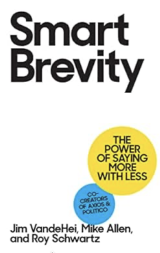
Smart Brevity: The Power of Saying More —_ _In “Smart Brevity,” Vande Hei, Allen, and Schwartz emphasize the importance of concise and impactful communication. They provide practical strategies and techniques for effectively conveying information clearly and concisely. They also highlight the power of brevity in capturing the audience’s attention and making a lasting impact.
Some favorite quotes:
“A strong word is vivid, precise and — here’s the big one — something you can see. It’s something real. A weak word is abstract — you can’t see it, touch it, taste it, take a picture of it (like “process” or “civics”).”
“You can talk, you can use slides, you can show pretty pictures. None of it matters if you don’t have a crystal-clear idea of what you want the audience to remember.”
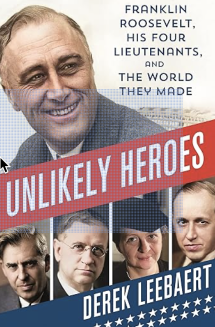
Unlikely Heroes: Franklin Roosevelt, His Four Lieutenants, and the World They Made.— In Strategic Doing, we talk frequently about the importance of a core team if you are trying to transform any system. Here, Leebaert provides us with a privileged glimpse into the core team on which Roosevelt relied. Each member of the team carried deep personal hurts and flaws, but together they guided a remarkable transformation of the U.S. economy. In an inspiring story, masterly written, Leebaert explores the transformative impact of this core team on the U.S. economy. The lessons from this history are clear: Through collaboration and a strong core team transformative change is possible, even in the face of personal challenges and adversity.
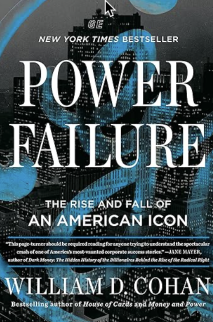
Power Failure: The Rise and Fall of an American Icon — In “Power Failure,” Cohan provides an engaging story of the fall of General Electric. He explores the internal and external factors that led to its downfall, including mismanagement, corporate culture, and external pressures. As a former consultant to GE, if find these histroies of the company both fascinating and predictable. Welch, held out as the epitome of successful corporate leadership, was revered and celebrated during his tenure, but Cohan sheds light on the darker side of his leadership. His obsession with numbers and short-term performance ultimately contributed to the company’s decline. This book sits alongside David Geddes book, The Man Who Broke Capitalism: How Jack Welch Gutted the Heartland and Crushed the Soul of Corporate America–and How to Undo His Legacy, which shed more light on Welch and his dangerous obsession with short-term financial metrics at the expense of GE’s long-term sustainability.
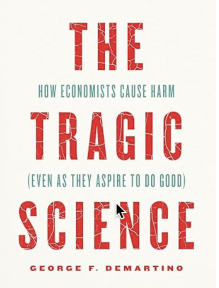
The Tragic Science: How Economists Cause Harm (Even as They Aspire to Do Good — A wide range of books are available that critique the field of economics, but “The Tragic Science” stands out for its comprehensive examination of how economists can unintentionally cause harm in society. This book represents an impressive effort by George DeMartino, a professor of economics, to come to terms with the problem of harm in economics.
Let me give you an example from my experience. The process of globalization was supposed to make everyone better off, and in theory, it does. But globalization created enormous, localized harms…the closing of steel mills in Youngstown devasted that community, and our efforts to help that community adjust have been feeble. DeMartino uncovers the unintended consequences of economic policies and highlights the need for economists to consider the human impact of their theories and recommendations.
Some favorite quotes:
“Critics of the economics profession have argued, rightly, that over the past century, the profession has tended to oversimplify and even trivialize harm. It has oversimplified by means of severe reductionism, in which all harms, no matter their nature, depth, duration, or causes, are reduced to the loss of “welfare” … It has trivialized harm by treating all harms as if they were entirely reparable, through compensation…”
“When a profession is in position to risk harming those it serves, it takes on an obligation to wrestle with the complexity of harm, the act of harming, the reparability of harm, the means to achieve repair, the claims of those who are harmed for repair, and the rights of those who face the risk of harm to decide whether to take the risk.”
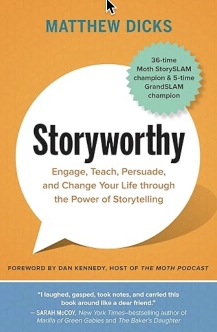
Storyworthy: Engage, Teach, Persuade, and Change Your Life through the Power of Storytelling.— The growing list of books on storytelling is difficult to manage, so I thought I’d share one book that is practical, inspirational, and fun. “Storyworthy” provides us with a guide to the art of storytelling. Matthew Dicks, a frequent contributor to The Moth (https://themoth.org), shows us the way, He takes us through his journey of becoming a master storyteller and shares valuable techniques and strategies for crafting compelling narratives. He shares with us that his stories are embedded in the moments of each day. And he encourages us to reflect on these moments and find the stories within them, reminding us that everyone has a story to tell.
In Strategic Doing, we talk about the power of the “opportunity narrative”, a concept that highlights the importance of telling stories to inspire action and drive change. (John Hagel in his book, The Journey Beyond Fear: Leverage the Three Pillars of Positivity to Build Your Success, provides an excellent section on opportunity narratives.)
Some favorite quotes:
“It’s a human need to be told stories. The more we’re governed by idiots and have no control over our destinies, the more we need to tell stories to each other about who we are, why we are, where we come from, and what might be possible.
— Alan Rickman”
“No one ever made a decision because of a number. They need a story.
— Daniel Kahneman”
“There are moments when you connect with someone in a new and unexpected way. Moments when your heart fills with joy or breaks into tiny pieces. Moments when your position on an issue suddenly shifts or your opinion of a person changes forever. Moments when you discover something new about yourself or the world for the first time. Moments when a person says something you never want to forget or desperately wish you could forget.”
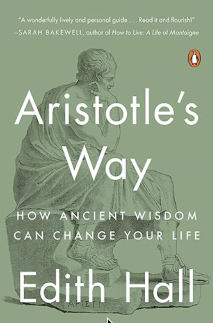
Aristotle’s Way: How Ancient Wisdom Can Change Your Life — Edith Hall, a classics scholar, takes us on a thoroughly enjoyable tour of Aristotle’s philosophy and how it might apply to us today. Hall makes a compelling case for using Aristotle’s wisdom as a guide for navigating the complexities of modern life. She explores Aristotle’s teachings on virtue, friendship, happiness, and living a meaningful life. For those of us in the U.S., we are quite familiar with the idea of happiness as expressed in our Declaration of Independence, but Hall goes deeper into Aristotle’s concept of eudaimonia, which encompasses not just individual happiness but also the flourishing of society as a whole. Eudaimonia is not merely a fleeting feeling of happiness, but a deeper sense of fulfillment and purpose that can only be achieved through living virtuously and contributing to the betterment of the community. As Hall notes, “Aristotle wrote for people energetically involved in their communities.”
Some favorite quotes:
“Becoming subjectively happy as an individual, Aristotle insisted, is your unique and momentous responsibility. It is also a great gift–it is within most people’s power, regardless of their circumstances, to decide to become happier.”
“Aristotle believed that if you train yourself to be good, by working on your virtues and controlling your vices, you will discover that a happy state of mind comes from habitually doing the right thing.”
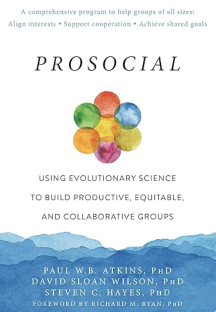
Prosocial: Using Evolutionary Science to Build Productive, Equitable, and Collaborative Groups — David Sloan Wilson, an evolutionary biologist, presents an insightful examination of human behavior and how it can be shaped to create more productive, equitable, and collaborative groups. He challenges the prevailing notion that humans are driven solely by self-interest (a key assumption of neoclassical economics and taken to the extreme by libertarian ideology). Wilson draws on insights from evolutionary science to argue that our natural inclination to cooperate and work together can be harnessed to create positive change. He argues that our evolutionary history has equipped us with cooperative tendencies that can be leveraged to enhance the functioning of groups and promote collective well-being.
Wilson’s book is deeply practical. For example, he explores the various dimensions of psychological flexibility, and how we can cultivate these underlying skills. Wilson ties the Prosocial framework — a set of core design principles — to Eleanor Ostrom’s principles for successful collective action, highlighting the importance of clear communication, fair distribution of resources, and shared decision-making processes.
Some favorite quotes:
“Goals are important for groups because they help them coordinate action in a shared direction, and because they motivate people to initiate and sustain effort, even when the going gets tough. But, done well, goals can also serve another critical purpose: they can help people learn and adapt over time.”
“Values are different than goals. Concrete goals can be achieved; you can make a million dollars, or get a degree, but once a goal is achieved it will likely lose its power as a source of further motivation. That is not true of values, and this difference is a major reason why values are so important. Values are only displayed or instantiated, not obtained or possessed, so while we may use them, they are never used up. They are a continuously available source of meaning and motivation, no matter what situation we find ourselves in.”
“Asking people what they deeply care about or want to move toward tends to foster a collaborative conversation that can motivate participation and connection with the group, which is why it’s one of the first issues addressed in collective decision-making processes.”